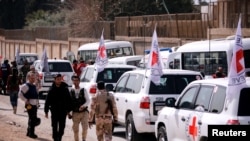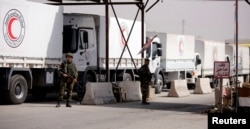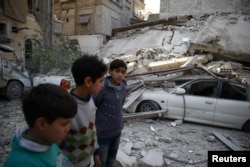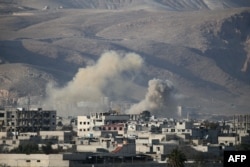An international convoy of humanitarian aid trucks cut short its mission to Syria’s besieged eastern Ghouta region after government forces continued their aerial bombardment and ground assault against the rebel enclave.
The convoy of more than 46 trucks left the region’s main town of Douma Monday evening to return to Damacus without being able to fully unload its supplies due to the violence.
“We delivered as much as we could amidst shelling,” UNHCR's Syria representative Sajjad Malik tweeted. “Civilians are caught in a tragic situation.”
U.N. officials said all the aid workers are safe.
In addition to the shortened mission, the United Nations and International Red Cross says Russia’s government blocked the rescue workers from loading most of the medical supplies they had planned to transport to the embattled region and would not allow them to be replaced by other items. They say the items included trauma, surgical and dialysis kits, insulin and other items.
It was the first aid shipment to reach the area outside Damascus since mid-February, when a deadly Russian-backed assault began on the rebels, branded as “terrorists” by Syrian President Bashar al-Assad. The U.N. Security Council’s demand for a 30-day cease-fire has yet to take hold, with Assad and his allies claiming the truce does not apply to the attacks on eastern Ghouta.
The Britain-based Syrian Observatory for Human Rights said at least 68 people were killed Monday in the latest attacks, even as the aid was arriving. That pushed the death toll to 760 in the last three weeks.
Syrian troops have reclaimed a third of eastern Ghouta, according to the Observatory, and are advancing further in an apparent attempt to split the rebel stronghold in two. The Observatory said one airstrike hit the region a kilometer away from where aid trucks were being unloaded.
The United Nations says 400,000 people are trapped in besieged eastern Ghouta, which it says was already running out of food and medical supplies before air strikes began two weeks ago.
Assad vowed Sunday to continue the assault, telling journalists, “The operation against terrorism must continue, while at the same time, civilians will continue to have the possibility” to evacuate from the war zone.
“There is no contradiction between a truce and combat operations,” he said. “The progress achieved yesterday and the day before in Ghouta by the Syrian Arab Army was made during this truce.”
In comments aired on state television, Assad dismissed Western complaints about a humanitarian crisis in eastern Ghouta as “a ridiculous lie.”
Russian President Vladimir Putin last week ordered a daily five-hour “humanitarian pause” in the fighting to allow people to to escape eastern Ghouta, but it does not appear anyone has left.
U.S. President Donald Trump and British Prime Minister Theresa May agreed Sunday that Russia and Syria are responsible for the “heart-breaking human suffering” in eastern Ghouta, May's office said.
They discussed in a telephone call what May’s office described as the “appalling humanitarian situation.”
“They agreed it was a humanitarian catastrophe, and that the overwhelming responsibility for the heart-breaking human suffering lay with the Syrian regime and Russia, as the regime's main backer,” May's office said.
A White House statement did not mention the phone call, but said Russia was ignoring the U.N. resolution demanding the 30-day cease-fire across Syria. The statement said Russia, which voted for the resolution, is killing innocent civilians under the “false auspices of counterterrorism operations.”
“This is the same combination of lies and indiscriminate force that Russia and the Syrian regime used to isolate and destroy Aleppo in 2016, where thousands of civilians were killed,” the statement said.




